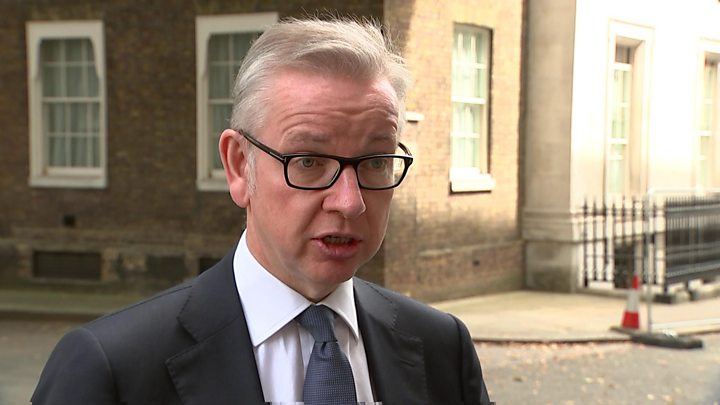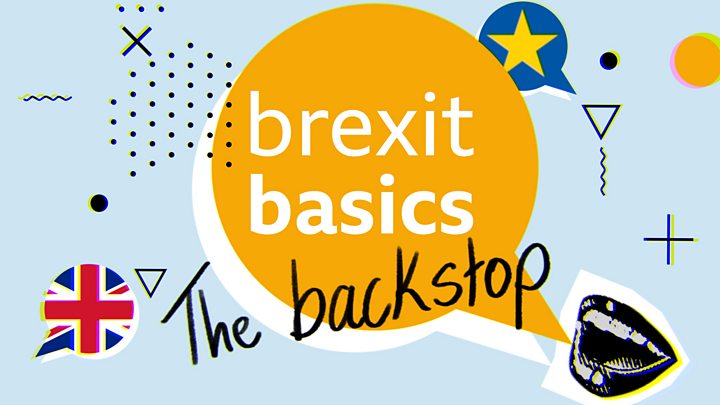Brexit: EU ‘refusing to negotiate’, says Gove

Media playback is unsupported on your device
Cabinet minister Michael Gove says the EU “seem to be refusing to negotiate with the UK” over a new Brexit deal.
Mr Gove, who is responsible for no-deal planning, said he was “deeply saddened” that Brussels was, in his words, saying “no, we don’t want to talk”.
It comes after the EU said UK demands to remove the Irish backstop from Theresa May’s deal were unacceptable.
Irish PM Leo Varadkar has reiterated that the withdrawal deal, including the backstop, cannot be renegotiated.
The European Commission said it was willing to hold further talks, “should the UK wish to clarify its position”.
Meanwhile, a group of politicians has started a legal action aimed at preventing Boris Johnson shutting down Parliament to force through a no-deal Brexit.
Theresa May’s deal has been rejected three times by MPs and as things stand, the UK will leave the EU on 31 October whether it has agreed a new one or not.
On Monday, EU negotiators told European diplomats there was currently no basis for “meaningful discussions” and talks were back where they were three years ago.
A senior EU diplomat reportedly said a no-deal Brexit appeared to be the UK government’s “central scenario”.
Addressing those suggestions, Mr Gove said: “At the moment, it’s the EU that seems to be saying they’re not interested, they are simply saying ‘no, we don’t want to talk’.
“I think that’s wrong and sad, it’s not in Europe’s interests”, he added.
Backstop concerns
Monday’s EU meeting followed discussion last week between the EU and the PM’s European envoy, David Frost, where he reiterated Mr Johnson’s stance that the backstop plan must be removed from Mrs May’s deal.
He also raised concerns about the UK’s “divorce bill” and the proposed role of the European Court of Justice, the EU’s top court, after Brexit.
Many opponents of Mrs May’s deal cite concerns over the backstop – an insurance policy to prevent a hard border returning on the island of Ireland – which if implemented, would see Northern Ireland staying aligned to some rules of the EU single market.
It would also involve a temporary single customs territory, effectively keeping the whole of the UK in the EU customs union. These arrangements would apply unless and until both the EU and UK agreed they were no longer necessary.

Media playback is unsupported on your device
Speaking on Tuesday in Belfast, Mr Varadkar told reporters he did not accept that a no-deal Brexit was unavoidable, adding there were “a number of ways” in which it could be avoided.
He said these options included ratifying Mrs May’s deal, further extending the UK’s EU membership, or the UK cancelling Brexit by revoking Article 50.
The BBC’s Brussels reporter Adam Fleming said the EU was grappling with how to deal with a prime minister in Boris Johnson who was demanding things they were not prepared to give.
He said the EU had not given up yet, and all eyes would be on the G7 summit in France at the end of August, which many believe could be the moment of truth – the point at which a no-deal Brexit may become inevitable.
Earlier, Mr Johnson met his first foreign leader since entering Downing Street – Estonian Prime Minister Juri Ratas.
The country’s Foreign Minister, Urmas Reinsalu, said earlier that while the “reality” was the withdrawal agreement – including the backstop – had been jointly agreed by EU member states, there was still a need for continued dialogue in the coming weeks to avoid a no-deal Brexit.
He told BBC Radio 4’s Today programme alternatives to the backstop could be discussed after the ratification of the withdrawal deal.
Last week the government announced an extra £2.1bn of funding to prepare for a no-deal Brexit – doubling the amount of money it has set aside this year.
The plans include more Border Force officers and upgrades to transport infrastructure at ports, as well as more money to tackle queues in Kent created by delays at the Channel.
Mr Gove said the government’s preparations for no deal had been stepped up and “the days of drift that we have had in the past have ended”.
He said the plan to take the UK out of the EU by 31 October was a “firm deadline”, and “we will be ready to leave come what may”.
Analysis by Jonathan Blake, BBC political correspondent
Not for the first time the Brexit process appears to be deadlocked. Both sides say they’re willing to talk and both sides want to avoid leaving without a deal.
But the UK and the EU are not negotiating because each has a position which the other says it can’t accept.
For the time being expect more tough talk from government ministers and similar from the EU.
But sooner or later, if both sides really do want to avoid leaving without an agreement, someone or something will have to give.
Come September when MPs return from their summer break there may be more attempts to prevent no deal, a move to force a general election – perhaps a subtle shift in the government’s position.
There’s nothing like a deadline to focus minds and if this one sticks, things could begin to happen very fast.
This summer stand-off can only last so long.




